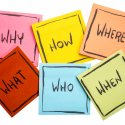Posted May 31st, 2019
By Kris Powers
In its latest revision of the International Classification of Diseases (ICD), the World Health Organization (WHO) has officially classified workplace burnout as an occupational phenomenon. This change will be reflected in the new version of the handbook, International Classification of Diseases ICD-11, which will go into effect in January 2022.
What is burnout? In the past, the WHO defined it as a “state of vital exhaustion”. But with the recent revisions to the ICD, it is now classified as a work hazard.
The new definition calls burnout a "syndrome resulting from chronic workplace stress that has not been successfully managed." Burnout is not being identified as a medical condition – but an occupational phenomenon.
The WHO reports that burnout is characterized by three factors:
- feelings of energy depletion or exhaustion;
- increased mental distance from one’s job, or feelings of negativism or cynicism related to one’s job;
- and reduced professional efficacy.
In a recent article released by NPR, Torsten Voigt, a sociologist at RWTH Aachen University in Germany, feels that this new definition affords people who suffer from burnout more “legitimacy”. "People who feel burnout are finally fully recognized as having a severe issue", he said. He also stated that the new definition may be a step toward making it easier for people to get help, at least in some European countries, where health professionals rely on the ICD.
Elaine Cheung, a professor of medical social sciences at Northwestern University Feinberg School of Medicine, said "I think a lot of people have a lay definition of what burnout may be," she says. "But I think by highlighting the specific facets of burnout ... my hope is that it might create greater awareness."
The WHO specifies that burn-out “refers specifically to phenomena in the occupational context and should not be applied to describe experiences in other areas of life”. In addition to this redefinition of “burnout”, the WHO plans to develop “evidence-based” guidelines for mental well-being in the workplace.
Are you experiencing burnout? The Mayo Clinic suggests you ask yourself the following questions as a “check list”:
- Have you become cynical or critical at work?
- Do you drag yourself to work and have trouble getting started?
- Have you become irritable or impatient with co-workers, customers or clients?
- Do you lack the energy to be consistently productive?
- Do you find it hard to concentrate?
- Do you lack satisfaction from your achievements?
- Do you feel disillusioned about your job?
- Are you using food, drugs or alcohol to feel better or to simply not feel?
- Have your sleep habits changed?
- Are you troubled by unexplained headaches, stomach or bowel problems, or other physical complaints?
If you answered yes to any of these questions, you might be experiencing burnout. These symptoms may be related to health conditions, including depression, so it’s important to talk to your physician or a mental health provider to get a proper diagnosis.
Approaching your employer about problems and issues in your workplace can be helpful if they are supportive in creating a positive, healthier work environment. It’s also important to develop self-care strategies, including exercise, a healthy diet, and getting enough sleep.
According to the Mayo Clinic, the consequences of burnout aren't just frustration and fatigue. Ignored or unaddressed job burnout can have significant consequences, including:
• Excessive stress
• Fatigue
• Insomnia
• Sadness, anger or irritability
• Alcohol or substance misuse
• Heart disease
• High blood pressure
• Type 2 diabetes
• Vulnerability to illnesses
It’s important to recognize the symptoms and do all you can to avoid burnout. The good news is that even after experiencing burnout, you can rediscover joy and meaning in your professional life.
If a career change is in store, visit Ed4Career to explore the career training opportunities we offer! Our courses are available 24/7 – on your schedule. We provide a great way to fit stress-free learning into your schedule. Contact us today to learn more!





